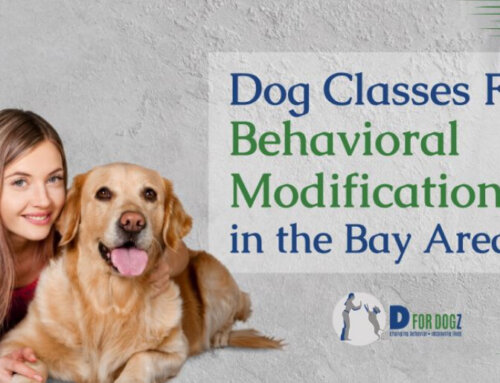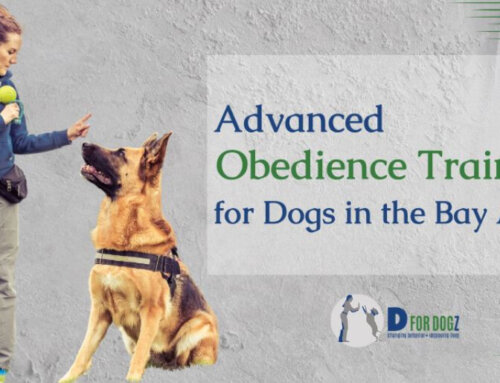Essential Puppy Vaccinations Before Socialization in San Jose
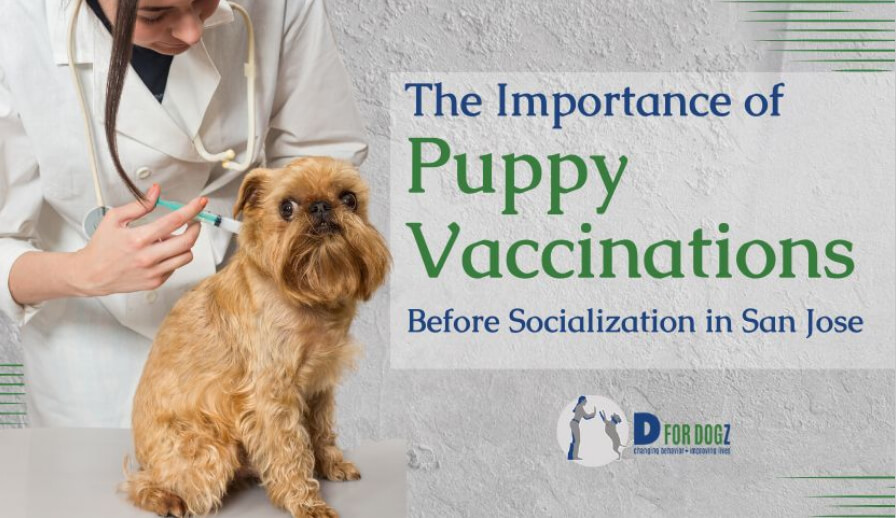
Vaccinating puppies before socializing is critical for their health and the safety of other dogs they interact with. This initial step ensures they are protected against common yet serious diseases like distemper, hepatitis, parvovirus, and rabies, which are not only life-threatening but can also severely impede their ability to socialize properly. Given the vital socialization window that occurs early in a puppy’s life, understanding and adhering to a vaccination schedule is essential for their development into well-adjusted adult dogs.
This guide provides a comprehensive overview of the necessary vaccinations for puppies in San Jose, aiming to prepare them for a healthy, social life.
Key Takeaways
- Timely vaccinations protect puppies against serious diseases like distemper, hepatitis, parvovirus, and rabies, enabling them to socialize safely and develop into well-adjusted adult dogs.
- The vaccination schedule for puppies, from 6 to 8 weeks up to the first year, is crucial for building and maintaining immunity against life-threatening illnesses.
- Beyond core vaccinations, puppies may require additional vaccines, such as bordetella, leptospirosis, and Lyme disease, depending on their lifestyle and exposure risks.
- Adhering to a proper vaccination timetable ensures the puppy’s health and socialization safety and fulfills legal requirements, particularly for rabies vaccination.
What Core Vaccinations for Puppies Should I Know?
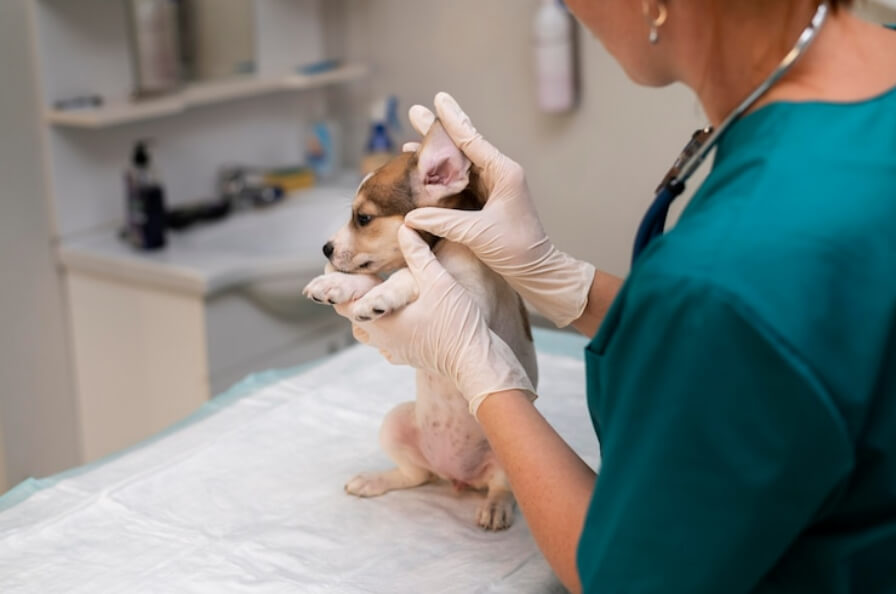
Image Source: Freepik
Ensuring your puppy receives its core vaccinations is the first step toward a healthy and sociable life. These vaccines protect against diseases that threaten your puppy’s health and impact its ability to socialize effectively. This section delves into the specifics of each core vaccine, emphasizing its importance in your puppy’s early life stages.
1. Distemper
Canine Distemper is a virus that affects dogs’ respiratory, gastrointestinal, and nervous systems. Highly contagious and potentially fatal, it can spread through airborne exposure or contact with infected bodily fluids.
Distemper has no cure; treatment typically focuses on supportive care to manage symptoms. Vaccination is crucial as it offers the best protection against this disease. It ensures your puppy can safely interact with other dogs and explore its environment without the high risk of infection.
2. Hepatitis (Adenovirus)
Canine hepatitis is caused by Canine Adenovirus Type 1 and affects the liver, kidneys, spleen, lungs, and eyes. Symptoms range from mild fevers and congestion to severe cases leading to jaundice, stomach enlargement, and pain, potentially resulting in death
Vaccination against canine hepatitis is essential as there is no cure for the disease, with treatments focusing on alleviating symptoms. Preventing this disease through vaccination can protect your puppy from serious health complications.
3. Parvovirus
Canine parvovirus is a highly contagious virus causing severe vomiting, bloody diarrhea, and dehydration in dogs. It is especially dangerous to puppies due to their developing immune systems.
Given its rapid onset and potentially fatal outcome, vaccination against parvovirus is critical. The vaccine significantly reduces the risk of infection, providing crucial immunity during the early, vulnerable months of your puppy’s life.
4. Rabies
Rabies is a viral disease that affects the central nervous system, leading to severe neurological symptoms and death. It is transmitted through the bite of an infected animal.
Rabies vaccination is crucial for your puppy’s health and a legal requirement in many areas. This vaccine protects against rabies infection, ensuring your pet’s safety and complying with local laws regarding pet vaccinations.
The core vaccinations for puppies—distemper, hepatitis, parvovirus, and rabies—are integral to a puppy’s early healthcare regimen. These vaccines provide a foundation for a healthy, friendly life, protecting against diseases that could otherwise hinder their development and interaction with other dogs and humans. Adhering to the recommended vaccination schedule ensures your puppy has the best start in life, equipped to explore the world safely and happily.
Additional Vaccinations Based on Lifestyle and Location
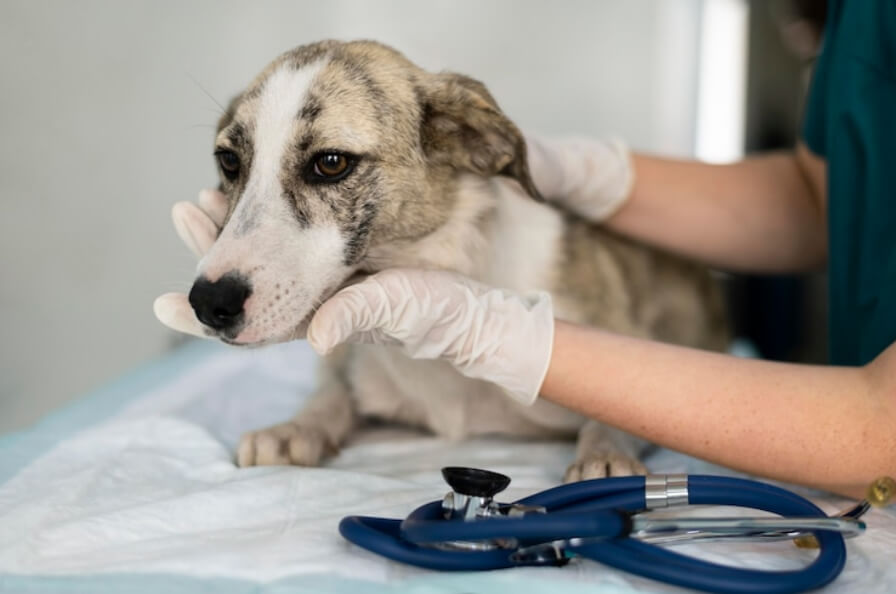
Image Source: Freepik
Beyond the core vaccinations, several other immunizations may be recommended for your puppy, depending on your location, lifestyle, and risks. These vaccinations are tailored to protect against diseases that are not universally a risk to all dogs but could pose a threat based on certain conditions.
a. Canine Parainfluenza
Canine Parainfluenza is a highly contagious respiratory virus and one of the several viruses that can contribute to kennel cough, a common respiratory disease in dogs.
Vaccination against canine parainfluenza is particularly recommended for puppies that will be spending time in boarding facilities, daycare, or any environment where they will be in close contact with many dogs. It helps prevent the spread of this part of the kennel cough complex.
b. Bordetella (Kennel Cough)
Bordetella bronchiseptica is a key cause of the highly contagious kennel cough complex. This bacterial infection leads to severe coughing, whooping, and, in some cases, seizures.
The Bordetella vaccine is often recommended for dogs frequently exposed to other dogs in social settings such as dog parks, boarding, or grooming facilities. This vaccine helps prevent the development and spread of kennel cough, ensuring your puppy can interact with other dogs without a high risk of contracting or transmitting the disease.
c. Leptospirosis
Leptospirosis is a bacterial disease that affects both animals and humans. Dogs can contract the bacteria from contaminated water sources or through direct contact with urine from infected wildlife.
The vaccination against leptospirosis is especially recommended for puppies living in or frequently visiting rural areas or locations with high wildlife traffic. Since the disease can be transmitted to humans, vaccinating your puppy can also help protect your family and the broader community.
d. Lyme Disease
is a tick-borne illness caused by the Borrelia burgdorferi bacteria. It can lead to joint inflammation, lameness, and other systemic issues in dogs.
The Lyme disease vaccine can offer additional protection for puppies living in or visiting regions where ticks are prevalent. Alongside regular tick prevention measures, this vaccine can help safeguard your puppy from the potentially debilitating effects of Lyme disease.
These additional vaccinations are crucial for puppies exposed to risks not covered by the core vaccines. Discussing your puppy’s lifestyle, environment, and potential exposure to various diseases with your veterinarian will help determine the necessary additional vaccines.
Puppy Vaccination Schedule
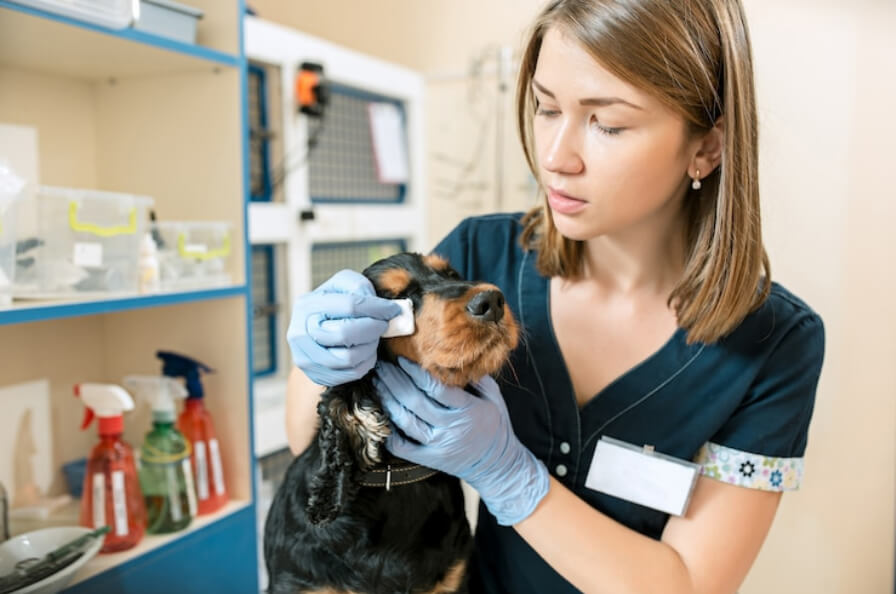
Image Source: Freepik
Properly timing your puppy’s vaccinations is crucial for their health and development. This section outlines the vaccination schedule for puppies, offering a framework to ensure they receive essential protection at the appropriate times.
Adhering to this schedule helps your puppy build immunity against serious diseases, allowing them to socialize safely with other dogs and explore their environment.
| Age | Vaccinations | Considerations |
| 6 to 8 Weeks | First Dose of Core Vaccines (Distemper, Parvovirus, Adenovirus) | Deworming and parasite control plan initiation. |
| 10 to 12 Weeks | Second Dose of Core Vaccines (DHPP) + Optional (Bordetella, Leptospirosis, Lyme) | Assessment for additional vaccine needs based on exposure risk. |
| 16 to 18 Weeks | Final Dose of Core Vaccines (DHPP) + First Rabies Vaccine | Health and lifestyle assessment for additional vaccine recommendations. |
| 1 Year After Initial Series | Annual Boosters (DHPP) + Rabies (as required) + Optional based on exposure (Leptospirosis, Bordetella, Lyme) | Annual health checkup and lifestyle assessment for booster and additional vaccine needs. |
Why is Timely Vaccination Important?
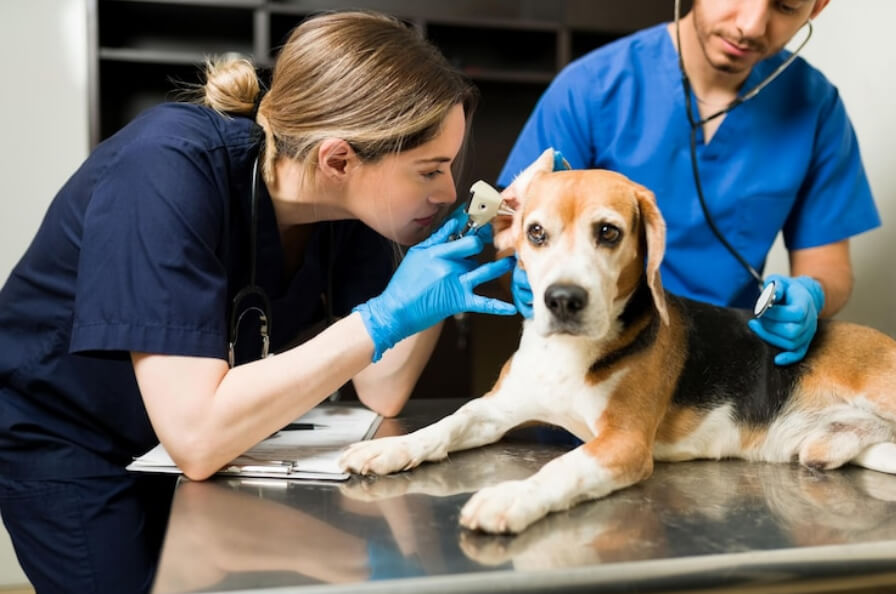
Image Source: Freepik
Adhering to a vaccination schedule is not merely a routine part of puppy care; it plays a pivotal role in ensuring your pet’s long-term health and well-being. Timely vaccination is crucial for building a robust immune system, ensuring socialization safety, and meeting legal obligations.
Here’s a detailed look at why each aspect is crucial for your puppy’s development and your responsibilities as a pet owner.
Building Immunity
Vaccinations stimulate the immune system to produce antibodies against diseases, essentially “teaching” the body how to fight off specific infections before they can cause illness. Following a particular timeline of vaccination is critical for puppies with developing immune systems. This is because maternal antibodies, passed from the mother through her milk, start to wane in the first few weeks of life, leaving the puppy vulnerable to diseases.
The timing of vaccinations is designed to bridge the gap between the fading maternal immunity and the puppy’s developing immune system.
Administering vaccines at the recommended intervals ensures that immunity is built up effectively and maintained, protecting against potentially life-threatening illnesses. Skipping or delaying vaccines can leave your puppy unprotected at a critical time when they are most susceptible to infections.
Socialization Safety
The early months of a puppy’s life are not just crucial for building immunity but also for their social and behavioral development. During this period, puppies learn to interact with other dogs, humans, and their environment. Proper socialization can prevent behavioral issues such as fear, aggression, and anxiety later in life.
However, socialization needs to be done safely. Vaccinating your puppy on time ensures they can participate in socialization activities, such as puppy classes and playdates. It can also walk in public spaces without the high risk of contracting diseases from other animals or the environment. This balance between health safety and social exposure is vital for raising a well-adjusted and happy dog.
Legal Compliance
Besides health and behavioral reasons, timely vaccination—particularly against rabies—is a legal requirement in many jurisdictions. Rabies is a fatal disease that can affect all mammals, including humans and is primarily spread through the bite of an infected animal. Due to the public health risk, many places mandate dog rabies vaccination and enforce strict penalties for non-compliance.
Staying up-to-date with the rabies vaccine protects your puppy and the public and ensures you abide by the laws of your community. It’s a critical part of responsible pet ownership, reflecting your commitment to the welfare of your pet and society at large.
Conclusion
Timely vaccinations are the cornerstone of a puppy’s health and socialization in San Jose, protecting against severe diseases and enabling safe, early social experiences. This concise guide highlights the critical vaccinations necessary for your puppy’s development, emphasizing the importance of a vaccination schedule for building immunity, ensuring socialization safety, and legal compliance.
By consulting with your veterinarian and adhering to recommended vaccination protocols, you’re setting the stage for your puppy’s healthy, happy life, contributing positively to the broader community’s well-being.
At D for Dog Training, we’re dedicated to ensuring your puppy’s best start in life through comprehensive training and socialization programs. Our expertly designed Puppy Socials in the Bay Area provide the perfect setting for your puppy to learn, play, and grow in a safe and controlled environment. Don’t miss out on the opportunity to give your puppy the social skills they need for a happy, well-adjusted life. Visit our Puppy Socials page today to learn more and sign up for an experience that will benefit you and your furry friend for years.
FAQS
About the Author: Kaajal Tiwary
Kaajal (aka “KT”!) loves puppies and is dedicated to getting new puppy guardians off on the right paw and guiding her students through the tough early days of owning a dog. Her goal? Transforming each bundle of raw puppy energy into the perfect adult companion.


